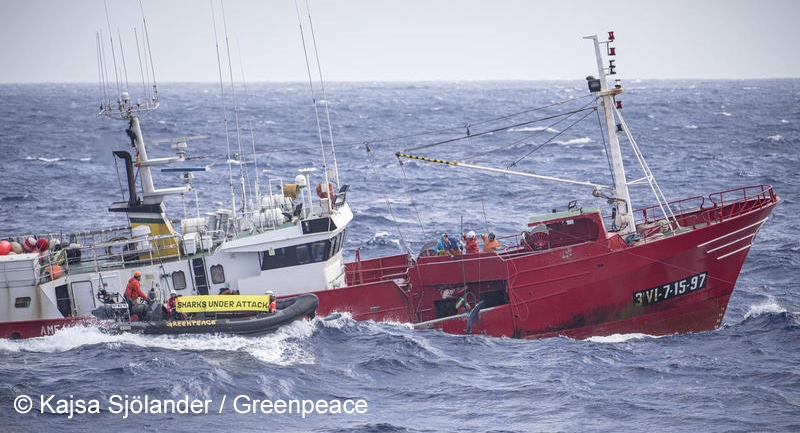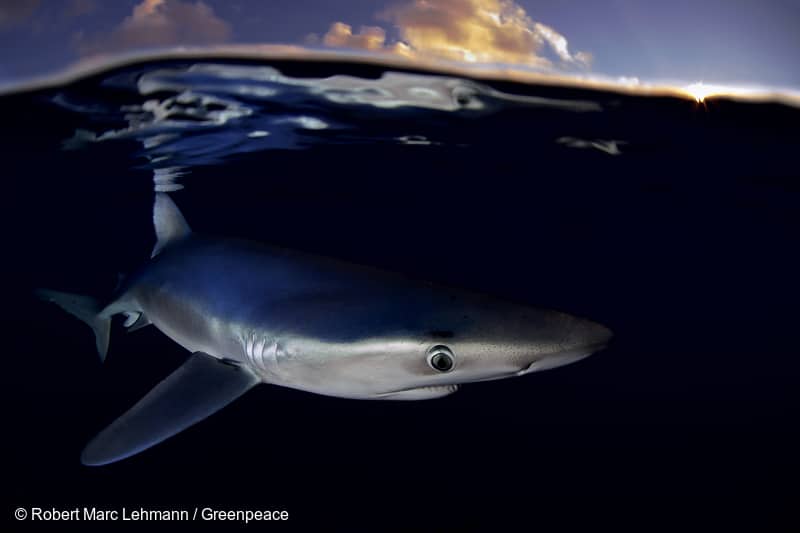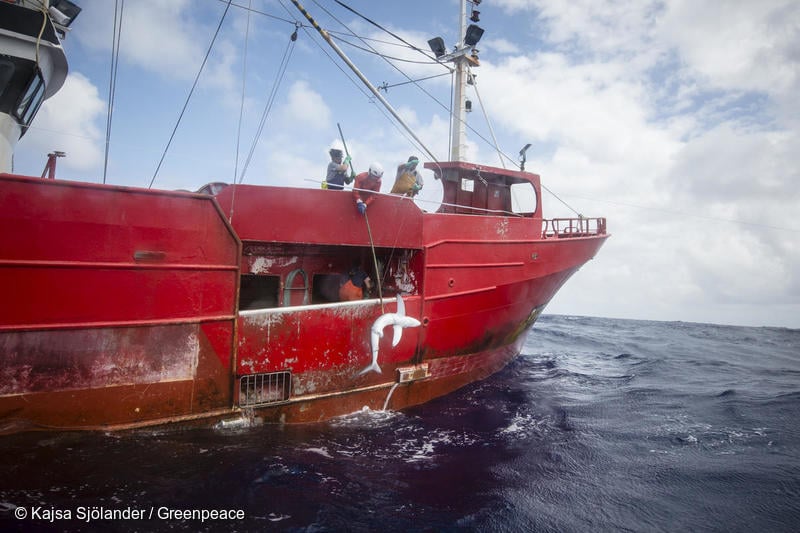Marine Life & Conservation
Thousands of endangered sharks slaughtered by overfishing

![]() Activists from Greenpeace International confronted a fishing vessel yesterday approximately 200 miles away from The Azores as it was hauling in sharks on a longline, capturing shocking footage of the vessel’s practices. The peaceful protest saw activists unfurl a banner with the message “Sharks Under Attack” and came as Greenpeace International releases a new report that reveals lack of protection in international waters is resulting in the deaths of tens of thousands of endangered sharks each year.
Activists from Greenpeace International confronted a fishing vessel yesterday approximately 200 miles away from The Azores as it was hauling in sharks on a longline, capturing shocking footage of the vessel’s practices. The peaceful protest saw activists unfurl a banner with the message “Sharks Under Attack” and came as Greenpeace International releases a new report that reveals lack of protection in international waters is resulting in the deaths of tens of thousands of endangered sharks each year.
In the North Atlantic, the Greenpeace ship Esperanza documented fishing vessels which, while known to be primarily catching swordfish, in fact collectively catch four times more sharks than swordfish (by weight). During the protest, the crew saw only one swordfish caught by the Spanish vessel Ameal and at least 8 sharks pulled from a line nearly 40 miles long. The shark species are currently being identified.
 A Blue Shark (Prionace glauca) near the Azores.
A Blue Shark (Prionace glauca) near the Azores.
“It is absolutely immoral to kill sharks and other wildlife with these terrible fishing practices. We are exposing the culprits at sea now, but we urgently need a strong treaty and tighter fishing limits to protect our global oceans,” said Will McCallum of Greenpeace’s Protect the Oceans campaign, on board the Esperanza.
The report also highlights the devastating impact that overfishing is having on shortfin mako shark populations, the world’s fastest shark, which is closely related to the great white. Greenpeace’s analysis shows that Spanish and Portuguese ships in the area are catching as many as 25,000 mako sharks annually.

Greenpeace ship Esperanza is investigating the overfishing of sharks in the North Atlantic ocean on transit to the Azores, Pole to Pole Tour 2019
The fishing vessels follow migratory routes of swordfish, using destructive methods like long lines with thousands of hooks, which also kill sharks and other animals. Sharks are mainly targeted for their fins, which some cultures prize as a delicacy.
An estimated 100 million sharks are killed every year. Greenpeace analysis shows that, despite official estimates that immediately stopping all catch of shortfin mako would result in only a 50 percent chance of their population recovering by 2040, the most recent catch data was 3,112 metric tons in 2017, equating to as many as 25,000 endangered sharks.
The report is launched as the Esperanza sails from the Arctic to the Antarctic undertaking ground-breaking research and investigations to campaign for a strong Global Ocean Treaty at the United Nations. A strong treaty could pave the way for the creation of ocean sanctuaries in 30 percent of the high seas by 2030, placing vast areas of the sea off-limits to harmful human activities and allowing marine life to recover.
Today there is no legal mechanism to create ocean sanctuaries in international waters and only around 1 percent of the oceans are fully protected. Alongside the widespread failure of industry and regional bodies to adhere to scientific advice, this enables the fishing industry to devastate marine ecosystems by using harmful practices to overfish, often in sensitive areas, and decimate shark populations worldwide. Many species of sharks are in danger of extinction and some populations have decreased by as much as 99 percent due to human activity.
Lifelong UK fisherman Jerry Percy, who has represented small–scale, sustainable fishermen across Europe, was on board the Esperanza and said:
“Smaller scale fishermen rely on healthy populations of sharks and other fish species at the top of the food chain to maintain the balance of marine life in the oceans. This allows us to make a sustainable living and at the same time support vulnerable coastal communities. But unregulated and lawless fishing is putting all this at risk, for short term profit for the few but long term losses for the many.”
Greenpeace USA Oceans Campaigner Arlo Hemphill added:
“Unfortunately, when it comes to the 64 percent of the ocean that lies in international waters, there is no organization or nation authorized with protecting its wildlife. There are bodies designed to protect fisheries, shipping, undersea cables, and even deep sea mining, but the species at risk and the broader ecosystem are largely on their own. This is why governments are negotiating a new ocean treaty, and why Greenpeace is calling for that treaty to be strong and endowed with the decision-making authority to set up ocean sanctuaries in places important to animals like these sharks.”
For more information about the work of Greenpeace visit their website by clicking here.
Marine Life & Conservation
Paul Watson Released as Denmark Blocks Japan’s Extradition Bid

Renowned anti-whaling activist Paul Watson has been released from custody in Greenland after spending five months in detention. Denmark’s Justice Ministry rejected Japan’s request for his extradition, citing insufficient guarantees that his time already served in custody would be credited against any potential sentence.
The 74-year-old Canadian-American was arrested on July 21 in Nuuk, Greenland’s capital, when his ship docked to refuel. His arrest was based on a 2012 Japanese warrant related to a 2010 encounter in Antarctic waters. Japan alleged Watson obstructed operations and caused damage to a whaling research ship during efforts to disrupt illegal whaling. Watson has consistently denied these claims, maintaining his commitment to marine conservation.
Denmark, which oversees extradition matters for Greenland, concluded that while the legal conditions for extradition were met, the lack of assurances from Japan regarding time-served credit made extradition untenable.
In a video shared by his foundation, Watson expressed gratitude and relief, saying, “After five months, it’s good to be out… and good to know they’re not sending me to Japan.” He added that the most difficult part of his time in custody was being separated from his two young sons.
Watson is a pioneering figure in marine conservation, known for founding the Captain Paul Watson Foundation in 2022 after decades of activism with the Sea Shepherd Conservation Society. His bold efforts to defend marine life have earned him widespread support, including from celebrities and conservationists. His work has also been featured in the acclaimed reality TV series Whale Wars.
Watson’s lawyer, Jonas Christoffersen, praised the decision, stating, “We are happy and relieved that Paul Watson is now free.” He added that Watson is eager to reunite with his family and continue his vital work.
The arrest occurred while Watson’s vessel, the M/Y John Paul DeJoria, was en route to the North Pacific with a team of 26 volunteers to intercept a Japanese whaling ship. His foundation described the arrest as politically motivated and emphasized that Watson’s actions were focused on ending illegal whaling practices.
Japan resumed commercial whaling in 2019 after leaving the International Whaling Commission, asserting that whale meat is a cultural tradition. Conservationists, however, continue to challenge these practices, highlighting their impact on marine ecosystems.
Despite the challenges, Watson remains steadfast in his mission to protect marine life and bring attention to whaling practices. His dedication to ocean conservation has made him a globally respected advocate for the environment.
Marine Life & Conservation
12 Days of Zero-Waste Fish-mas

This holiday period, the Marine Conservation Society, the UK’s leading ocean membership charity, invites you to make some simple changes to eating fish this Christmas to help our seas.
Dr Kenneth Bodles, Head of Fisheries and Aquaculture at the Marine Conservation Society, said, “During the festive season, our consumption increases, but so does waste. Sustainability isn’t just about where food comes from – it’s also about how you use it. By reducing waste and making the most out of your seafood, you’re not only taking steps to be more ocean-friendly, but can also help to cut costs during what is often one of the most expensive times of the year”.
The Marine Conservation Society has compiled twelve tips on how to consume seafood sustainably with zero-waste this Christmas:
Buy whole fish instead of fillets
Instead of fillets, consider buying whole fish such as salmon, hake, or lemon sole. By adopting a “nose to tail” approach with cooking, whole-baked fish not only feeds a crowd, but also helps to minimise waste and maximise sustainability by using up every part of the animal, including bones, skin, and fat.
Make fish stock
Leftover fish bones or shells can be put to good use by boiling them to make a nourishing fish stock or bisque. This can be frozen and preserved for later use and makes for a flavourful base in a soup.
Make your own fish pâté
Avoid waste by turning leftover fish, such as smoked mackerel or salmon, into a delicious pâté by blending with cream cheese and lemon. Perfect when paired with crackers.
The sustainability of salmon and mackerel varies depending on where and how it is caught or farmed. For more information on green-rated options, check the charity’s Good Fish Guide.
Buy frozen
By purchasing seafood that is frozen or vacuum-packed, this helps to reduce waste by extending the shelf life of your food.
Fish pie
If you’re wondering what to do with leftover cooked fish, why not opt for a classic fish pie with mashed potatoes, leeks, and a cheesy sauce? A sure crowd pleaser on Boxing Day.
Use the head
Don’t forget the fish head! The meat is incredibly tender and flavourful. The charity recommends a cod’s head curry or recreating Fallow’s renowned cod’s head in siracha butter.
By stretching your ingredients further, not only is this a more sustainable way to enjoy seafood, but also cost-effective by repurposing leftovers and cooking creatively.
Boxing Day brunch
Mix leftover kippers or smoked salmon with scrambled eggs for a tasty, zero-waste, Boxing Day brunch.
For best choice, make sure you buy kippers, or herring, from the North Sea and the North Irish Sea.
Zero-waste storage
A top tip from the Marine Conservation Society to avoid waste is freezing fish offcuts to save for future use.
Crisp up the skin
Even leftover fish skin can be turned into a quick savoury snack by crisping it up in an air fryer with a little olive oil and salt.
Anchovies two ways
Leftover anchovies can either be blended with butter to make a delicious anchovy butter or tossed into pasta for a hit of umami flavour.
The charity recommends opting for anchovies caught in the Bay of Biscay for best choice.
Fishcakes
For an easy, zero-waste meal, leftover seafood trimmings can be mixed with mash and fried in breadcrumbs to make fishcakes.
Pickled mussels
Try pickling mussels in 1:1 vinegar and water, with a dash of sugar for a sustainable, zero-waste snack that can be enjoyed well beyond the festive season.
Mussels farmed in the UK are a seafood superhero. Grown using low-impact methods and harvested by hand, they get all the food they need from the sea around them. This makes them one of the most sustainable, ocean-friendly, and cost-effective seafood options.
Players of People’s Postcode Lottery have raised £6.6M towards the Marine Conservation Society’s vital work in making seafood more sustainable.
Laura Chow, Head of Charities at People’s Postcode Lottery, said: “Fish is a festive favourite for many, but making sustainable choices when it comes to how we buy and eat seafood makes all the difference for our ocean. Support from players of People’s Postcode Lottery has helped the Marine Conservation Society further its sustainable seafood work, so that we can all enjoy healthier, better protected seas.”
The Marine Conservation Society encourages you to make sustainable seafood choices a year-round habit, not just for Christmas. To check how sustainable the seafood on your plate is, you can visit the charity’s Good Fish Guide. The Guide helps consumers and businesses identify the most sustainable seafood using a simple traffic light system, based on where and how species are caught or farmed. Green is the best choice, amber means improvements are needed, and red indicates fish to avoid buying.
Zero-waste gift idea
Why not embrace a zero-waste Christmas by gifting a membership to support marine conservation? It’s a meaningful, low-waste gift that helps protect our ocean for generations to come. Memberships start from as little as £5 a month – the price of a sandwich and drink from your local coffee shop.
Find the latest sustainable seafood advice for wild-caught and farmed seafood on the Good Fish Guide, downloadable to your phone from www.mcsuk.org/goodfishguide.
-

 News3 months ago
News3 months agoIconic SS United States to become the World’s Largest Artificial Reef
-

 Blogs2 months ago
Blogs2 months agoScubaverse Christmas Gift Guide 2024: Day 4
-

 News2 months ago
News2 months agoSanta Divers take the Plunge for Charity
-

 Blogs2 months ago
Blogs2 months agoScubaverse Christmas Gift Guide 2024: Day 1
-

 News3 months ago
News3 months agoDiscover Turquoise Divers and Media Luna Beach & Dive Resort: A Premier Diving and Relaxation Destination in Roatan
-

 Blogs2 months ago
Blogs2 months agoScubaverse Christmas Gift Guide 2024: Day 5
-

 Blogs2 months ago
Blogs2 months agoScubaverse Christmas Gift Guide 2024: Day 2
-

 News3 months ago
News3 months agoToucan Diving at Plaza Beach and Dive Resort Bonaire Introduces PADI Mermaid Training



